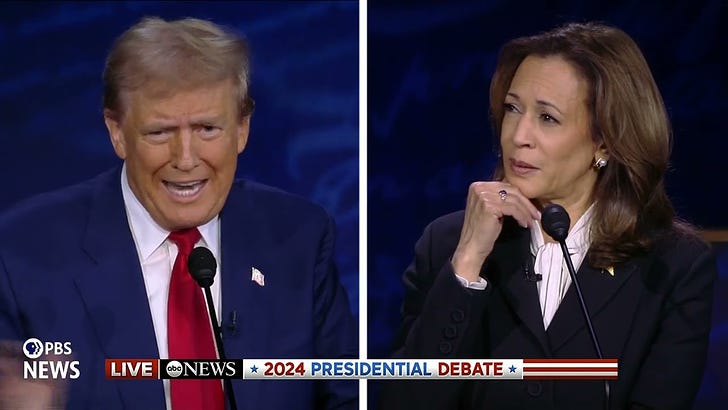Borkowski Media Trends: Presidential Debate, Barclaysmen & MORE
PLUS Dave Grohl's bold crisis strategy...
Kamala’s Mindgames and Taylor’s Endorsement
The presidential debate is a subjective medium, and in the polarised, post-truth political landscape of the USA, it is often impossible to know who won, but on Sunday night Kamala Harris came as close as possible to earning a decisive victory, back up by bookmakers and pollsters.
The contrast between President Biden’s display of confused frailty, which many saw as the final nail in his ambitions for a second term, and Harris’ well-prepared, composed and sly performance was stark and a telling symbol of the challenges facing a Trump campaign that had geared up for a contest against Biden.
Harris’ much publicised headline tactic was to follow up flurries of attacks on Trump’s policies with jabs at his ego.
Her comment about Trump’s low rally attendance is being cited as the clearest example of this strategy, and his sabotage of his own opportunity to talk about immigration – usually his populist comfort zone- with a grumbling and petty rebuttal, the clearest evidence of its success.
Of course, it wouldn’t be a Trump debate without the former president creating at least a few deranged new memes, and his ‘transgender aliens’ and ‘eating the pets’ efforts were instant entries into his pantheon, but do not appear to have won him a great deal of serious support.
If you want to know how the American pro-Trump right is feeling about the debate and the election in general, X is the digital embodiment of the movement’s psyche. Led by Elon Musk’s incessant pro-Trump, anti-Harris soliloquy, it’s notable that in general, Trump supporters on X aren’t even trying to claim that he won the debate, rather than it was fixed by the network in Harris’ favour, or that her admittedly superior performance is not indicative of her ability as president.
It’s telling that even in a social media landscape where the politically polarised try to deny black-and-white truths on a minute-by-minute basis, even Trump’s cheerleaders can’t quite bring themselves to claim that he won this round.
Taylor’s Endorsement has Swift Impact
Another boost for Harris came in the form of a rather wordy endorsement by perhaps America’s most famous person, Taylor Swift, a continuation of her endorsement of Biden in 2020, but also a backlash against Trump supporters’ attempts to fake her endorsement for their candidate using AI.
Whilst the impact of any individual endorsement on polls and overall media sentiment is small, it’s worth noting, in comparison to our analysis of Elon Musk’s Trump endorsement last week, that Meltwater data shows that when VP Harris and Swift are mentioned together, 59% of non-neutral mentions were positive, 38% more than when Harris is mentioned alone. For comparison Elon Musk’s endorsement only bettered Trump’s own sentiment by less than 3%. It won’t swing the election, but it’s another glimpse at the cultural power of Taylor Swift.
The Barclaysmen Strike Back
Following a highly-publicised summer tournament, one has to wonder who at UEFA thought an international break three weeks into a new football season was a good idea – barely bedded in, with little time for a pre-season, players were once again shunted off to take part in the opening games of the Nations League. Football’s online commentariat were left with little to do other than, as the saying goes, sit around naming old football players. But at what point does saying “Who remembers Morten Gamst Pedersen?” become a trend?
Sparked initially by a video of Harry Redknapp’s Portsmouth team set to Just Jack’s Starz in their Eyes, videos of old footballers, including Pedersen himself, soundtracked by 2000s landfill indie classics quickly took over Twitter this week. Nicknamed “The Barclaysmen” by the Cultras Football Podcast, a reference to the Premier League’s former sponsors, the term trended across Tuesday and Wednesday, with some clips quickly racking up thousands of views. Amongst the players pulled from the recesses of the collective memory were Roque Santa Cruz, Rory Delap, Steven Pienaar, and Matty Taylor. There were broad, if unspoken rules, about exactly what constituted a Barclaysman: they could not have played for a Big Six club, they certainly can’t play in the current Premier League, and they all shared a vaguely maverick skillset, never quite making it to the top flight of players, but fondly remembered by those who were there. Being managed by Neil Warnock, Sam Allardyce, or Redknapp himself was a bonus.
The popularity of the videos speaks perhaps to a general disillusionment with the current state of football – with the advent of the “data era”, where players are scouted for their ability to fit into certain systems, a spontaneity encapsulated by the Barclaysmen has potentially been lost. The vast amounts of money in the sport, and the constant news stories about financial fair play and profit and sustainability, have likely also contributed to a hankering for perceived simpler times, when teams like Wigan, Portsmouth and Blackburn could genuinely compete in the League without the backing of a billionaire, or a state.
Predictably, brands tried to cash in, with Sky Sports in particular getting a sour reception to a “build your own Barclaysmen team” post. But for a trend that reached so far and wide, it remained remarkably organic, perhaps because the essence of it was rooted precisely in a dissatisfaction with the changes wrought in the modern game. It’s impossible to say for sure, but more people may well have thought about Morten Gamst Pedersen this week than Harry Kane. What can the League and UEFA learn from that? We may well need more left-footed midfielders smashing goals in from the halfway line, but what fans seem to want even more from their clubs is, for any corporation, that most nebulous of traits – authenticity.
Dave Grohl’s dug himself quite a hohl…
Given lingering criticism of their upcoming live tour, it would've been safe to assume the biggest rock music-related news story this week would've been Oasis-related. And it almost was with the announcement of more Wembley tickets going on sale and that Blur vs Oasis feud is set to be retold in a new West End play.
But suprisingly the legendary rockstar Dave Grohl stole the limelight with an out-of-the-blue Instagram post that the Foo Fighters frontman had fathered a baby outside his marriage.
For a revelation as shocking as this one, we are used to a period of speculation in traditional/social media. Given how damaging this statement is to Dave Grohl's "nicest guy in rock" reputation, the decision to move to the dry, PR-prepped social media statement is usually a calculated risk when faced with insider or public pressure. A 'good statement' can ease this pressure, although we're used to seeing statements that stoke more backlash, deepening the crisis.
So to see an out-of-context statement that unveils shocking details in so few words is a bewildering tactic that has completely backfired. It's as if Grohl's team has skipped a step in his crisis strategy, demonstrating how difficult it is to manage these situations. In modern terms, once the story becomes a meme, it extends the crisis, and you're running the risk of immortalising the moment within certain circles, i.e. rock enthusiasts aren't going to forget this moment for many years.
The statement almost begs for more details that weren't in the ether: who is the mother, what triggered Grohl to release this sudden statement, and given Grohl's 'family man' brand, why is this so at odds with his perceived personality?
Given the handling of this situation, questions will be asked, which will linger for some time. There's ample public curiosity, and the media will be circling to discover answers to these questions. Given the bold handling of this crisis, there's a slight chance we move on relatively quickly, but it wasn't a risk worth taking, and Grohl almost certainly has a long journey ahead to fix his bruised reputation.






